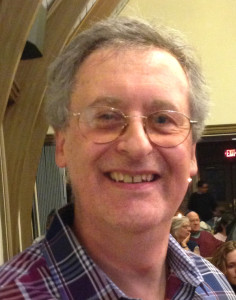On October 29, 2014, exactly two weeks after celebrating his 89th birthday and exactly one week after entering the hospital with pneumonia, my father died. My mother, my two sisters, and I were present at his bedside when he breathed his last. We had known for several days that his chances of recovery were slim, and we were struggling to come to terms with the fact that he most likely would not leave the hospital alive. Still, there was hope. He had been unresponsive for over 24 hours, although earlier in the day, he had briefly opened his eyes. A tear trickled down his cheek, and we were confident that he knew we were there. Shortly before 3 PM, his breathing stopped. We held his hands, hugged him, kissed him, told him how much we loved him. His bedside monitor confirmed what our minds knew but our hearts could not accept. Dad gave one final exhalation, and his soul left this earthly plane. Sobbing, we hugged each other. My sisters and I called our respective spouses, and we sat down. The resident physician came in to officially pronounce death, offered his condolences, and left. We continued to sit in communal yet private grief, none of us willing to say that final good-by. Finally, I took it upon myself to declare it time for us to go; the nurses needed to do their post-mortem care, and we needed to plan a funeral, the first step in the process of mourning.
We went back the apartment that my father and mother had shared for so many years after moving to Margate. There is that cliché that when a loved one dies, you expect them to walk through the door at any time. In my case, I expected to find Dad where he usually was: in his recliner, reading, watching television. Instead, the chair was empty. The apartment was empty. Immediately, we all started making phone calls to family and friends.
The next day, we met with the undertaker. I was impressed with his professionalism and compassion. Having been in the business for a long time, he was able to anticipate all our questions and to guide us through the entire process. Dad, always the organizer, had already written out his autobiography, which made it easier for us to compose his obituary on the undertaker’s laptop computer.
Shiva officially started that Friday, but there was to be a memorial service at Congregation Beth Judah in Ventnor that Sunday. I elected to return home to Clifton for Shabbat, then go back to Margate with Mimi after Shabbat ended. Although inconvenient, it made logistical sense on a number of levels. But that was not the most important reason. What drove that decision was my desire to say Kaddish in the presence of my own community, my Shomrei Emunah family. I wanted to be among the people who knew me as one of their own, most of whom had already experienced what I was just beginning to go through. Best decision ever!
After Shabbat ended, Mimi and I drove to Margate. We spent Sunday at my sister Allison’s house; as expected, there were a lot of visitors, few of whom I knew, though Mom knew most of them. That evening, Mimi and I returned home.
On Monday, I began sitting Shiva in my own home (Mimi and I had already picked up the Shiva chair and siddurim the previous Friday). A few people came by during the day, and so did food. We had ordered some on our own, but the food from my fellow congregants was ample and infinitely more delicious. Must have been the love that was added to it.
That night was the first of the three Shiva minyanim. So many people came that evening that we overflowed the living /dining room. Over the years, I have attended many Shiva minyanim and have had the privilege of leading a number of them. And so I led this service. But what a difference! At those other services, I was consoling others. Now, I was the one being consoled. Previously, I was there to comfort the mourners. Now I was the mourner in need of comforting. As Rabbi Greenstein pointed out, it is a mitzvah for a mourner to lead the service. But it is an achingly hard mitzvah to perform. On one hand, it is your standard weekday Maariv service with its familiar liturgy. On the other hand, the setting is, well, wrong. It’s taking place in my house, I’m not wearing shoes, there is a low uncomfortable chair reserved only for me and there is a covered mirror by the stairs. When we reach the Full Kaddish, the liturgy changes: one line is omitted, as if to jolt me out of any sense of familiarity. In due course, it’s time to recite the Mourners’ Kaddish. I had already recited it at Dad’s funeral and on Shabbat at the synagogue. Now, my father’s death had invaded my own home, my last refuge of safety. Each word drives home the reality of loss while, at the same time, affirming the infinite greatness and compassion of the Almighty. I don’t know how I made it through that first Kaddish; well, yes I do (see the previous sentence). I came to understand that saying Kaddish is not so much an obligation as it is a privilege, so much so that our tradition provides a chance to say it twice.
As the service concluded, I had the opportunity to share memories of my father. Mentally, I had prepared a short list of broad topics that I could touch on, hoping that I would have something different to say each night. I needn’t have worried. As I started to speak, each memory triggered a new memory, which in turn brought forth still other memories. I thought of things I had not thought of in decades. More importantly, I felt free to share these memories, here in the midst of this holy community.
The next day, Tuesday, more visitors stopped by. That evening, we again had a large crowd, and again I felt the warmth of my Shomrei family. I expected that on Wednesday, the number of visitors and minyan attendees would drop off. Much to my surprise, throughout the day, barely ten minutes went by wherein we didn’t have visitors. That evening, we had enough people for at least two minyanim.
Thursday was the last day of Shiva, which meant that I would sit for an hour, then leave the house to take a walk around the block. And so I sat in that uncomfortable low chair for one hour. At approximately 10 AM, Mimi and I walked around the block. Appropriately, it was a gloomy, rainy day. Normally, when I walk that circuit, I turn right and circle the block clockwise. At the suggestion of Jerilyn Margulies, I opted to take a counterclockwise route, thus adding to the strangeness of being outside again. I had thought that the purpose of the walk was to symbolically reenter the world. As I got about halfway around the block, it occurred to me that I couldn’t reenter the world, because it was no longer the same world. The world that I had left had my father in it; this new world didn’t, and it felt wrong. We returned home, uncovered the mirrors, folded up the chair. At some point, the rain stopped, so I brought the chair and siddurim back to the shul. Later in the day, Rabbi Greenstein called to see how I was doing. When I related my impressions about the walk, he said that the real purpose is simply to GET OUT. As painful and confining as the Shiva observance is, it is easy to get used to the womb-like comfort of one’s home and never want to leave. When you have to do something hard, you start with baby steps, i.e. a walk around the block.
The next day, I went back to work. It felt strange, almost other-wordly. I was able to maintain a light schedule for a few days. I had to take frequent breaks to be alone with my thoughts and tears. Over the next few weeks, life returned towards normality, but it would never be the same. I would call my mother frequently and visit when I could
Several months have passed since that week of sadness and grief. I am back to all my old routines. I attend services as before, but now, at the appropriate time, I join the other mourners of Zion in reciting Kaddish. I do this to honor my father’s memory, and I do it for me. I miss him so very much, but at those moments, I feel him close to me, and the ever present sense of loss is tempered with comfort.
- Alternative Torah Reading - Thu, Sep 14, 2023
- My Week of Shiva - Mon, Mar 9, 2015
- The Windy Gragger: Purim Shpiel - Thu, Feb 26, 2015



Thank you for sharing this personal and poignant story. I think it will help others as we inevitably face these losses.